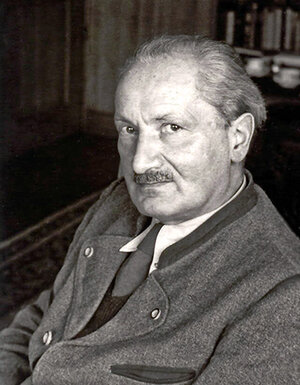14 December
Heidegger and the Myth
Peter Trawny
One of the later definitions of Heidegger’s own thinking is: ‘Mytho-Logy of the event of appropriation’. In this sense it is important to understand Heidegger’s own explanations of ‘myth’ and ‘logos’, as we find them at the beginning of the 1930’s. ‘Myth’ is the context in which Heidegger can locate his narrative of the ‘history of Being’. In this ‘history’ the ‘gods’ and the ‘last God’ are playing a leading role. The ‘gods’ and the ‘last God’ (for both Hoelderlin’s poetry is the key) appear as an alternative to Christianity, which is harshly ‘criticized’ in the ‘Black
Notebooks’. ‘Theology’ is replaced by ‘mythology’. My paper wants to unfold the influence of the problem of the ‘myth’ on Heidegger’s thinking including the problem of Bultmann’s ‘demythologization’ and anti-Semitism (Judaism as the death of the ‘myth’ – and as the source for the ‘myth’ of ‘the Jew’).
15 December
Heidegger and the Reinvention of Paulinism
Hans Ruin
I will discuss the idea of a supposedly ‘original Christian’ religious experience as it is developed in Heidegger’s seminal interpretations of Paul in the early 1920’s. In particular, I shall focus on how the problem of tradition and inheritance is thematized in this encounter; the notion of a tradition that is at once cancelled and reinvented in and through this very cancellation. Through Paul and his notion of a ‘destruction’ of tradition, Heidegger finds his own philosophical voice in an early Jewish messianic critique of history. This is one of the partly ‘hidden’ sources of his thinking, that need to be rethought anew in relation to the Black Notebooks and their understanding of Christianity, Judaism and the question of religion generally.
Religious Aspects of the Black Notebooks: Overview & Analysis
Judith Wolfe
This paper gathers all significant remarks on Christianity in the Black Notebooks and analyses them in the context of Heidegger's attitude to religion at the time – which we already know from recent research to have been particularly conflicted during this period. The paper then offers a summary of the ways in which references in the Notebooks change our understanding of Heidegger's view of Christianity during the 1930's, and draw conclusions about Heidegger's continuing relevance to theology. In particular, the Notebooks reveal greater continuity between Heidegger and the secularized Christian hopes of the 19th century than Being and Time suggests, and so challenge the confidence with which some theologians have hoped to find a radically new approach to faith and theology in Heidegger's thought.
Why Heidegger Didn’t Like Catholic Theology
George Pattison
Much of the content of the Black Books relates to Heidegger's irritation with what he saw as a range of misinterpretations and misappropriations of his work. These include those who see Being and Time as derivative of Kierkegaard and Nietzsche as well as those who try to apply Heidegger's thought to contemporary philosophical issues. He is particularly hostile to Catholic theology, naming Romano Guardini as exemplifying what is wrong in such applications. The paper will explore Heidegger's antipathy in relation to Guardini's own theological-philosophical project with the aim of specifying just what Heidegger saw as the essential point at issue.
Hermeneutics of Human Existence – From Luther and Kierkegaard to Heidegger, Levinas, and Ricœur
Claudia Welz
In this paper, I will discuss two questions, namely (1) the role of theology for Heidegger on the one hand, and (2) Heidegger’s continued relevance for theology on the other hand – despite the sad discoveries in his ‘black notebooks.’ The first question will be explored by means of a critical investigation of Heidegger’s reception of Reformation theology (in particular Luther and Kierkegaard). My answer to the second question involves an appraisal of Heidegger’s phenomenological approach to religion in the form of a hermeneutics of human existence. How can the latter be reformulated? With reference to Levinas and Ricoeur, a critique of Heidegger’s methodology will be proposed that reflects upon the consequences of his preoccupation with ontology at the expense of ethics. Taking the Phenomenology of Religious Life and Being and Time as my points of departure, I will examine his re-definition of key terms such as ‘conscience,’ ‘guilt,’ ‘temptation,’ ‘sin,’ and ‘freedom.’

